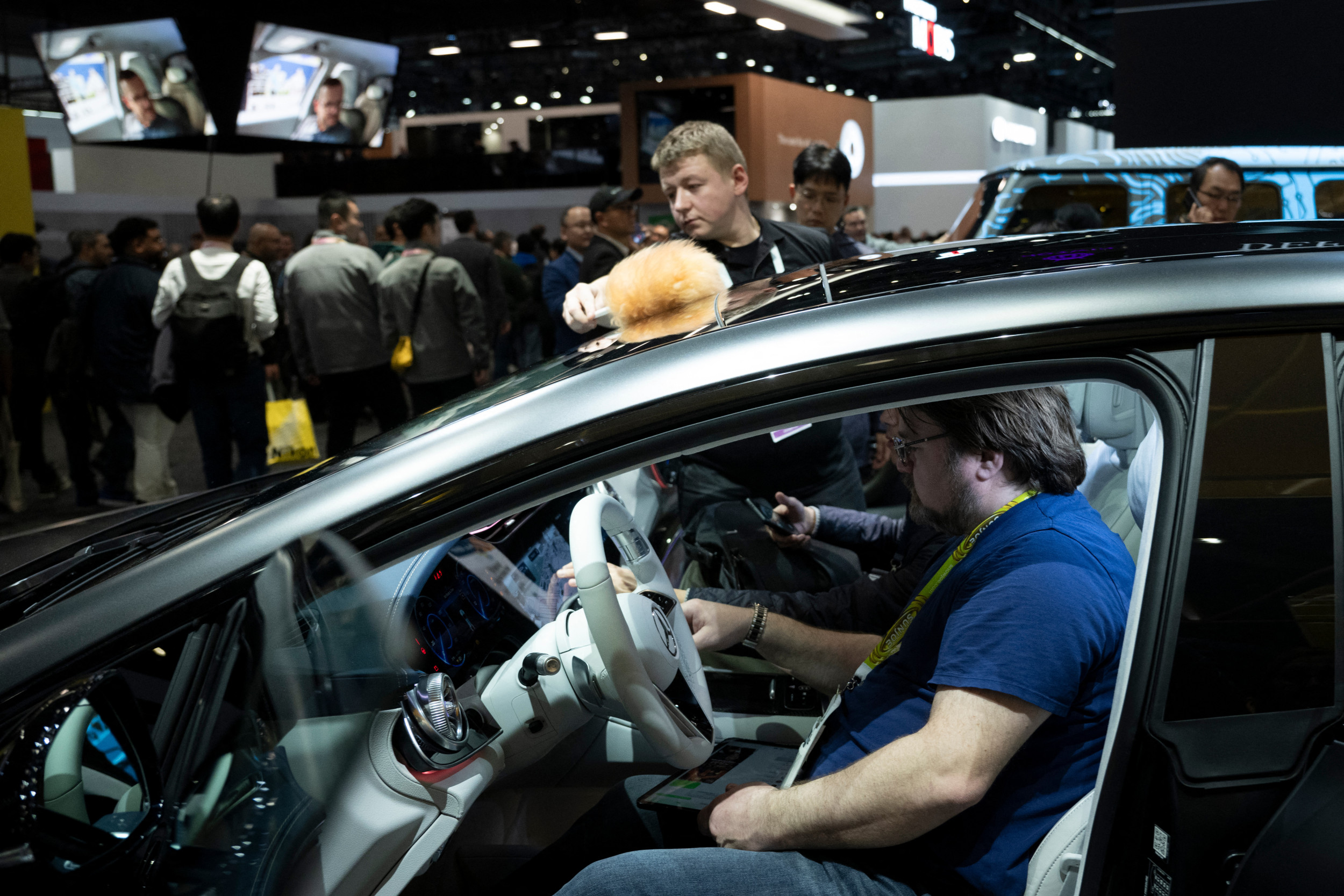LOL, if you think that’s bad, wait 'til you find out that the suburbs can’t afford roads, either!
Car-dependency is a fiscal disaster on both the micro- and macro-scale, let alone everything else catastrophic about it.
It is also a disaster on an environmental scale, and not just due to emissions.
For sure! I could write a novel about “everything else catastrophic about it” (and probably have by now, if you concatenate my previous Lemmy and Reddit comments on the subject), but that would distract from my point that the headline “Americans can no longer afford their cars” applies in more ways than one.
Shut your pie hole, I’m trying to mine lithium over here! /s
Cars have always been relatively expensive to own and operate and the American way, unfortunately, has been to take out lines of credit in order to purchase vehicles they could just barely afford.
It’s insane to think about but the average car payment for a new vehicle in 2023 was $726 and the average loan term is nearly 70 months!
I’ve always lived by two rules when it comes to vehicles:
-
Never buy new. Buy approximately two years old used low mileage
-
If I can’t afford the vehicle on a three year note, I can’t afford the vehicle
Additionally, always secure third party financing and have it in your back pocket, but don’t tell the dealership that part until absolutely necessary. They may try to match it, but their fine print has always had catches it in that make it a worse option in my experience.
I’m not sure if these rules will work going forward as prices seem to have doubled in the past three years, and I’m loathe to ponder how purchase is getting replaced by subscribe.
My current car is ten years old with 110k miles on it. I keep it super maintained because I can’t stomach the thought of my next buying experience.
As a young adult who wanted to avoid debt, my rules were somewhat similar
-
Car must be used, for sale by private seller. Avoids dealership fees, warranty fees etc.
-
If I cannot buy it in full, in cash that day, I cannot afford it.
I bought my first car on credit. After my last payment, I diverted that money into dedicated savings for the next car. Kept me from lifestyle creep and paid myself interest instead of the bank.
As a young adult in Europe (the place where walking and biking safely is possible), my rules were:
- Rent apartment close to work
- Don’t need car and I still commute to work faster then my collegues
I am entirely convinced US cities were design by the car lobby.
Those are good rules.
American cities used to be designed around reasonable things like walking and using Streetcars but then were bulldozed to make way for the automobile.
Not built by, but rebuilt by. And all the tram networks were bought and purposefully destroyed by car and oil companies in the early 20th century.
-
The sweet spot for me was buying cars in roughly the 6 year rage. Specifically Toyotas and Hondas. My last car was an '06 Accord and it was a fantastic car. Affordable to buy, no bullshit, cheap to repair and required repairs rarely, drove great, solid interior. I would have kept driving it for another 5-10 years easy if I hadn’t moved to a country/city where driving is totally unnecessary.
My buddy bought it off me and did some minor things to it and is still happily driving as his daily commuter right now.
I live by nearly the same rules. No more than 3 years max, and a check in my pocket from my credit union. But I not afraid to go older if the vehicle is on hood shape and reasonably low mileage. Vehicles depreciate for age, condition, and mileage. I will take the savings of a 5-7 year vehicle if the condition and mileage are great. But they are hard to find, it often takes a couple months of looking.
I totally agree with your rules here, however I recently helped my mom buy a new car (2023 Nissan Murano) and while sitting with her in the finance room deciding on warranty stuff I realized that cars are mostly 100 interconnected computers on wheels. This means the most likely thing to break on a car is a computer. This is something only the dealer can fix probably. Because of this you can’t get the same kind of warranty on a used car, only new.
The warranty my mom on this new car is great and it will cover any kind of computer issue for years. If she had gone and saved a bunch of money by picking a used car from the same year or 1-2 years old she could not get that warranty, and if a computer issue popped up years later it could be terribly expensive.
The computers are, by far, the most reliable parts of a car. They’re not subject to mechanical stresses or wear, and the real-time/embedded operating systems are far more fault resistant than desktop/phone OSes. The computers also mean that you can buy a $20 OBDII scanner and have the car tell you what’s wrong with it. Maybe an extra $10 for an app that will decode most of the manufacturer-specific codes. The difference between those $30 diagnostics and the $10,000 system the dealer uses is mostly that the dealer system includes all the manufacturer codes and step-by-step directions for fixing each fault.
Maybe an interesting aside, i have an associate who makes a living being the guy mechanics call. When they can’t figure out how to do what the computer is telling them to do, they have a contract with his company where he’ll walk them thru the repair. He can see all the data from their shop obdii thingy too, and helps troubleshoot remotely.
He says the effect of this system over the years (in his experience) is that in-shop mechanics are increasingly untrained guys ‘off the street’ who ‘don’t know shit from shit’
Just thought that was an interesting tidbit about the industry or even a sign of the future of that job
They can also change things, like idle speed. You also need one for any form of electric vehicle.
Thanks for this, it makes a lot of sense actually. Oh well, my mom has her car and the warranty she will hopefully never need, but it’s there if she does. I guess it all comes down to care tactics in the dealership, pressuring you to buy warranties and such that you may not need and cannot buy at any other time except right then.
I’ll be sticking with the recently used philosophy for the future though.
On any device with moving parts, the parts that fail most early and often are the moving parts. Solid state electronics are not moving parts.
Bro genuinely bought a Nissan trying to avoid excessive maintenance 💀
The computers actually make them easier to work on. They monitor and throw codes when things go wrong. A Google search will usually give a list of probable causes. I have troubleshooted and replaced some unusual parts because of that ability (e.g. shift position sensor). And the computers rarely fail themself.
I bought an 8yo car 2 years ago. It’s just about to hit 100kkm on the odometer, and cost me a couple grand today as a result of the previous owner’s lack of care/maintenance.
I’ve been upgrading/replacing things as I’ve been able to afford to, but this is the last car I buy (that isn’t electric) as a result of the ridiculous pricing of vehicles today. I certainly couldn’t afford the car I CURRENTLY OWN if I had to buy it today.
Also note I adore this car, otherwise I wouldn’t be putting all this time AND money in, it would be one or the other (or sale :D )
Luckily for me public transport and emobility vehicles (scooters, bikes and skateboards, [I chose skateboard]) in my city are much better than the average in my country. Also regarding emobility vehicles I’m in one of the only states where they aren’t banned (except on private property).
I’m hoping I get many more years of smiles out of my road legal track car, in the event I don’t it will be sold (or stripped out for track only) and I’ll just ride my bike more, it’s faster and makes a better noise anyway.
On top of being much better for the environment, I hope EV conversions become commonplace very soon. I would much rather (regrettably) convert my car to EV than buy a purpose built one, I don’t need GPS, lane keep, cameras, spyware, a giant tablet screen (otherwise known as a distraction) and a small fortune for every one of those components that fails. I just need instruments to tell me if the car is working as designed/intended.
Sorry for the wall of text folks, as you were.
I think statistically speaking the absolute best value is a 5 year old car that has been at least reasonably well-maintained. The vast majority of depreciation happens during those first 5 years.
For those that do need to finance a car, a three year loan term should be the maximum. I think you are 100% correct on that. There are people with car loans that have terms of 7 years. It’s sad that people are setting themselves up for failure like that. If you can’t afford the monthly payments on a 3 year term then you really can’t afford the car at all.
I buy much older vehicles, know how to fix them, and generally will keep them a few years and sell them at a non loss. I’ve done this for nearly 25 years, never spent more than $1,000 to repair a vehicle in a year (only happened thrice in 25 years that I’ve come close to $1,000) and in all but those three times I’ve never spent over $500 a year in maintenance on any of them.
Never had a car payment. Always kept at least two vehicles. Before family life it was a daily driver and a sports car of some sort. I’d sell the sports cars before they’d even need a new set of tires. Never lost a dime on any of those. Camaros, corvettes, s2000, etc.
Learn to fix your cars and options get way nicer if you want to be cheap about it. A 12 year old car doesn’t really depreciate that much if you keep it a few years. A 2009 will be found for about the same price as a 2006.
Currently I have an 08, an 06, and a motorcycle from 96.
I am exactly the same.
-
Brand new cars in 1973 were like $2500 ($17000 in today’s dollar). No one wants to sell compacts in the US anymore because people love their giant SUVs.
By the time you pay off your car, it’ll be a piece of junk. How does leasing the car compare?
Leasing is like setting money on fire and using money to put the fire out. The only scenario it ever makes sense is vs buying and selling a car every 2-3 years.
Modern cars are extremely reliable, there isn’t a good reason to need a new one in less than a decade unless it’s involved in an accident.
That was my only hesitation for buying an EV: they’re too new and changing too quickly to have much track record on how well they last. I did go ahead though, so we’ll see in 10-15 years.
Historically my practice is to buy a reliable car new and keep until major repairs, usually 10-15 years. It helps if you are able to set aside sufficient money to avoid a loan
Leasing is usually a worse choice financially. However it can make sense in a few scenarios such as having to always have a new car and business expensing. Now might be one of the few times it’s worth leasing, in the US for some EVs where a lease can take advantage of the full tax incentive but a purchase can not
Stop buying suvs and trucks. Buy compacts and small sedans. As those markets erode it just makes everything worse.
Couldn’t buy a house, so now we have to rent. Now that we can’t afford rent, might as well live out of a car. Now cars are too expensive, might as well live out of a cardboard box.
Owner Class: “Hey - it should trickle down any minute. I know you’ve been waiting 50 years for it, but it’s gonna come this time. Meanwhile, please subscribe to our Cardboard-Box-as-a-Service.”
EDIT: Oops, I just got back from my beating. My owners wanted me to add an additional addendum:
“Cardboard-Box-as-a-Service (CBaaS) has some additional benefits. Our free tier allows you access to the box, along with special promotions from our sponsors that will play inside the box. Parking comes as an extra service in order to comply with the law. We will provide details on what surcharges you can expect, but our partner providers can communicate what rental fees for land for the CBaaS entail.”
“Our Premium Tier will remove ads. And finally our Super Premium Tier includes a bidet. Water service for the bidet is included with up to 10 bidet cycles per user, with additional licensing available for additional fees. Water pressure may be throttled when many concurrent users are using their bidet. We will release new details on additional plans to increase your booty stream priority, once we figure out how much we can get away with.”
I am tempted to save this comment just to see how accurate it is in ten years.
Can I cry yet?
I am seeing way too many ads for diy shipping container homes. Yep, Amazon is going to corner the market when they age out their containers.
Pathetic.
“Yea, but the rents are outrageous” - Bender, Futurama
Bezos just saw this post and cardboard box prices just tripled. Thanks a lot.
I’m impressed you sprung for the corrugated
Gotta buy the premium materials while supplies last
Have you seen how much cardboard boxes cost now?
Source: just got notice of lease termination, been looking into moving logistics
When the cost of cardboard is out of reach, what do?
Let us take to the sewers, brothers. One day we shall return to the surface and bring the Vermintide
I blame trucks.
Right. Cars aren’t really on the market. These cramped, low visibility, shit-mileage behemoths are the reigning force on the market now.
– and right up my chuff.
That’s because Americans are fucking idiots that WANT these behemoths…
15 years ago, I’m worried about spending 25k on a car, my friend went out and bought a huge Chevy pickup that was over 40k…
Here’s the twist, he made a quarter of what did…
Less than two years later it was repo’d.
deleted by creator
Stop buying brand new Escalades and super F150s that you don’t really need.
I can barely afford the 2015 Subaru Crosstrek i bought back in July. Even 8 year old base model cars cost over $16,000 these days
Hard to find a decent manual in my area for sub-10, too. Lucked out on a 20-year old f150 with very little wrong with it for 4 grand, then another 4 grand to fix it up.
Would’ve spend 7 grand on a Ranger with a machinegun rod knock.
I’m not a real man unless I have two bank notes in the $80k-$100k range each.
Yeah, but I’m a real man’s man and I have to have a very large truck to hide my small manhood. 'Murica!
Cain’t git uh cuntry gurl wit no sissy moe bill.
If we’d always been accounting for all the actual costs of cars, including externalities, most people would have never been able to afford them, we’d recognize them as the very costly luxeries they actually are, and not have completely dismantled our ability to live without them in every city except NYC, Boston, Chicago, DC, and San Francisco.
You could say that about everything. If you would account for all actual cost no one would fly, eat steaks, own 2 TVs or change phones every 2 years either. We would buy things that last 10-20 years and replace them only when they are broken. As we used to…
Slippery slope aside, I think reducing unnecessary consumerism would be beneficial for our most vuneral populations. There would be a lower barrier of entry into the economy and more resources would be available at a lower cost for people who cannot afford them
Oh, I wasn’t making a slippery slope argument. I meant that this is what should happen. We exported most of the devastating impact on the environment and the terrible working conditions to developing countries so that we can enjoy tons of crap we don’t really need. If things we buy would reflect the actual costs we would have to limit how much we consume. Of course no one would like it.
Well, it’s a mixed bag. There have been absolutely incredible advances in efficiency that do enable a lot of things to genuinely be much cheaper and accessible than they used to be, but some of that is also just the ability to throw external costs on other people (climate change, for instance). This is why things like carbon taxes are so strongly supported by economists.
Steak, for instance, is hugely subsidized by how little farmers have to pay for water, along with other government benefits. Flying has environmental costs, but those are reasonably quantifiable and, per flight and per passenger, not that insane as far as I understand.
I do think consumer electronics are a bit of a different story though. Yes, cheap labor plays a huge role there, but those labor costs aren’t completely divorced from reality; the fact of the matter is that east Asian labor is actually chap. Ocean shipping and modern production plants are insanely efficient, though again climate costs need to be captured.
But east Asian labour is cheap because of bad working conditions, weak workers’ rights and no environmental protections.
Don’t forget poverty wages and lower standards of living.
Cars actually make more sense in low density areas. Farmers need to get around. Urban areas should rely mostly on public transportation.
Of course, but it’s all those in the middle where we need better options. US has just a handful of cities with decent transit, but every large city should be able to. Then there are all the medium cities built around using cars: transit should still be a better option but works better with concentrations of people
It should be reasonable for a majority of the population to have effective transit, even in the US
Up until I got an EV I never thought about dollar per 100 km. On “fuel”, I used to be near $20/100km for my premium powered midsize SUV.
On the other hand, the world could have its first trillionaire within the decade!
And you know how like 1 billion seconds is 31.7 years…guess how many 1 trillion seconds is in years…
...you ready?
A little under 31,690 years
But unlike Americans living in an unaffordable country, our future trillionaire earned it…right?
I just did the math. Don’t do the math.
For added context: 1 million seconds is “just” 11.6 days.
100,000 seconds is 27.8 hours.
10,000 seconds is 2.8 hours.
Americans can no longer afford
their carsnot to mention insurance costs and taxes
used vehicles cost nearly same in most cases and in poor condition
yes let us blame trucks not the $7.50 minimum wage and the inflation and what have yous
biden and electric vehicle are not the jesus of our times
going to take a lot to make travel affordable again and on that note the more traveling costs the less people do it and the less they travel the more stuck in the state they are at they become
way more than prohibitively expensive vehicles here this is a means to keep citizens in place and poor
yes let us blame trucks not the $7.50 minimum wage and the inflation and what have yous
¿Por qué no los dos?
So señor!
Y-….you guys used to be able to afford cars?
According to an October report by Market Watch, Americans needed an annual income of at least $100,000 to afford a car, at least if they’re following standard budgeting advice, which says you shouldn’t spend more than 10 percent of your monthly income on car-related expenses.
This is a dumb way to determine whether someone can “afford” a car.
What’s a better metric?
Comparing the amoritization of paying off a loan to the amount of debt held.
Can you expand?
Monthly payments depend on loan term and interest rates as well as principal. I don’t think that is a good way to determine whether you can afford something.
They didn’t list out every factor of the standard advice. The standard advice also includes 20% down and no longer than a 48 month payback period. So it more or less locks it in, other than rate.
NEW cars. Used market is just fine but people always want that new new.
Absolute losers LOL
Someone is stuck in 2010s. The used car market has been ridiculously hot and not buyer friendly for several years now.
I haven’t looked in 8 years. I am too afraid. Plan to just throw money at my existing car until I die.
Stick with the devil you know, baby. Just got my 1991 van back from the mechanic. Smells like a refinery fire, but it’s fucking reliable.
I know right? I was in a real bind recently. My friend sold me his used car from 2005 for 1500 dollars and i almost sucked his dick
The article also says used car market up 38%. Average costs up by more than the new car’s percentage















